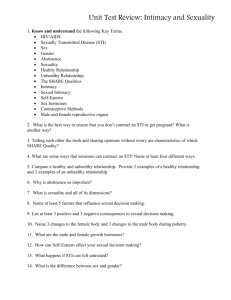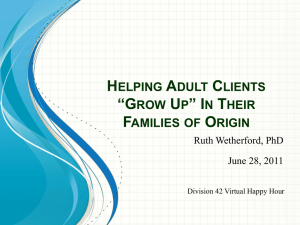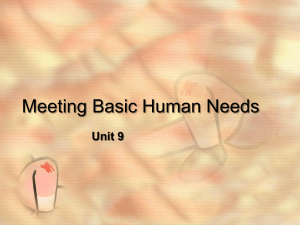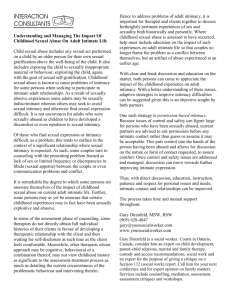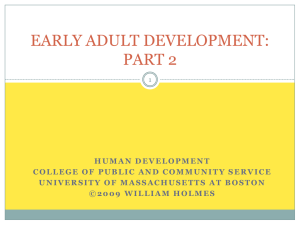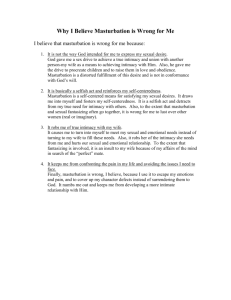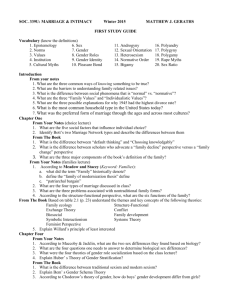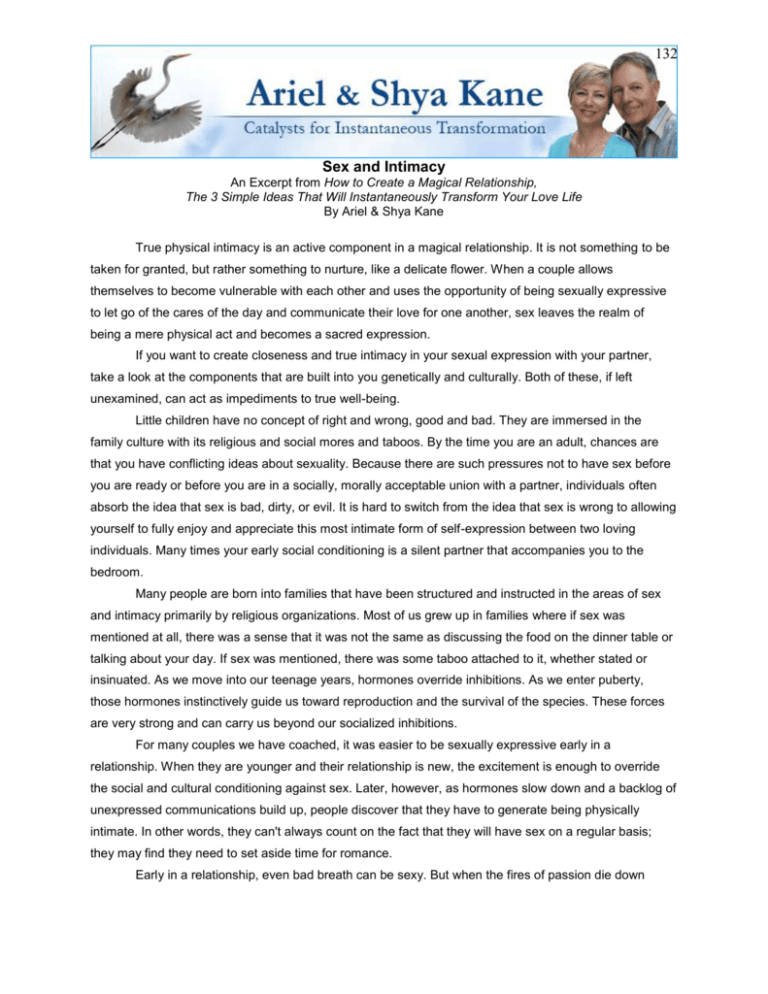
132
Sex and Intimacy
An Excerpt from How to Create a Magical Relationship,
The 3 Simple Ideas That Will Instantaneously Transform Your Love Life
By Ariel & Shya Kane
True physical intimacy is an active component in a magical relationship. It is not something to be
taken for granted, but rather something to nurture, like a delicate flower. When a couple allows
themselves to become vulnerable with each other and uses the opportunity of being sexually expressive
to let go of the cares of the day and communicate their love for one another, sex leaves the realm of
being a mere physical act and becomes a sacred expression.
If you want to create closeness and true intimacy in your sexual expression with your partner,
take a look at the components that are built into you genetically and culturally. Both of these, if left
unexamined, can act as impediments to true well-being.
Little children have no concept of right and wrong, good and bad. They are immersed in the
family culture with its religious and social mores and taboos. By the time you are an adult, chances are
that you have conflicting ideas about sexuality. Because there are such pressures not to have sex before
you are ready or before you are in a socially, morally acceptable union with a partner, individuals often
absorb the idea that sex is bad, dirty, or evil. It is hard to switch from the idea that sex is wrong to allowing
yourself to fully enjoy and appreciate this most intimate form of self-expression between two loving
individuals. Many times your early social conditioning is a silent partner that accompanies you to the
bedroom.
Many people are born into families that have been structured and instructed in the areas of sex
and intimacy primarily by religious organizations. Most of us grew up in families where if sex was
mentioned at all, there was a sense that it was not the same as discussing the food on the dinner table or
talking about your day. If sex was mentioned, there was some taboo attached to it, whether stated or
insinuated. As we move into our teenage years, hormones override inhibitions. As we enter puberty,
those hormones instinctively guide us toward reproduction and the survival of the species. These forces
are very strong and can carry us beyond our socialized inhibitions.
For many couples we have coached, it was easier to be sexually expressive early in a
relationship. When they are younger and their relationship is new, the excitement is enough to override
the social and cultural conditioning against sex. Later, however, as hormones slow down and a backlog of
unexpressed communications build up, people discover that they have to generate being physically
intimate. In other words, they can't always count on the fact that they will have sex on a regular basis;
they may find they need to set aside time for romance.
Early in a relationship, even bad breath can be sexy. But when the fires of passion die down
133
through insensitivity to each other, stresses at work, and the incredible demands of parenting, then
physical intimacy becomes yet another demand made upon the couple.
Many people don't realize that sex and intimacy become less pleasurable when there are even
small, withheld communications. Frequently these withheld communications build into resentments, with
sex becoming part of the battleground. The withholding of sex becomes a weapon to use against a
partner as revenge for transgressions, whether real or imagined.
If you are withholding sex from your partner as a form of letting him or her know that you are
angry about something, this is one of those times that fully demonstrates you are more interested in being
right than in being alive. This form of fighting denies you pleasure, warmth, a feeling of closeness, love,
touching, and physical intimacy. But you get to be right that your partner did it wrong, and now you are
punishing him or her--and also yourself--which leads to feeling less alive.
Before the two of us got together, we each had other partners. We came to our initial date with a
history of things that worked in relationships and things that were problematic for us. Very early on in our
dating we talked about what was important to us regarding sexual intimacy. This in itself was a
breakthrough, because in the past, neither of us had had such a frank conversation with any partner at
any time during a relationship, much less in the very beginning.
To begin with, Shya had recently experienced a long-term relationship in which his partner
withheld sex. After talking about this, we made each other a promise: if one of us wanted to have sex and
said so, then the other would approach the sexual union as if it were his or her idea with the intention of
loving the experience. Little did we know that this one simple, little agreement would become a stabilizing
foundation for our relationship. It allowed us to pull ourselves past the tiredness, distractions, and upsets
of the day into the realm of intimacy and pleasure. If you truly engage with your partner as if each sexual
interlude is your idea with the intention of loving the experience rather than enduring it or getting it over
with, miracles can happen. With this promise in place, our bedroom and intimate time became a
sanctuary from the cares of the world rather than a battleground.
The same evening that we adopted that initial agreement, Ariel made a confession. In her sexual
history with other partners, orgasms were elusive. She found that often her partner climaxed and she felt
left out or frustrated. So Shya promised, "Whenever we have sex, I promise that if you want an orgasm,
we will make sure that you have one before we finish."
This allowed Ariel to relax and play and put attention on Shya without having to worry about
things getting too carried away so that she was left hanging--she knew that she would leave the
encounter feeling satisfied as well. Interestingly enough, with the resulting relaxation, trust, and ease
between us, orgasms became easier and effortless.
Now the agreements we made with each other have faded into the background, but initially, they
134
allowed us to surrender to each other. They were a support structure that helped us pull ourselves past
the automatic "don't tell me what to do."
Prudishness and Sexual Suppression
Many people have ideas or fantasies about being sexually free and expressive, but when faced
with the reality of the sexual act, oftentimes old conditioning and programming takes over. When you are
raised to believe--or know--that sex is bad, dirty, immoral, or sinful, then those beliefs unexamined will
severely erode the possibility of having a fulfilling sexual relationship with your partner.
We knew a man who used to go drinking with his buddies, and the conversation would frequently
turn to sex and their girlfriends and wives. During these get-togethers, he and his friends would fantasize
about what they would like in a woman. "Oh, I would really love it if my lady were more aggressive. You
know, be a tiger in bed," he'd say.
One night, his wife loosened up and became the tiger he had always wanted, but the strangest
thing happened. In the midst of their lovemaking, he got scared and started to worry. He had thoughts
like, I wonder where she learned how to do this? I wonder if she was some kind of professional before I
married her? What have I gotten myself into?
Immediately, he found himself getting tight and withdrawn, and their lovemaking for that night was
over. His judgments of her were so apparent and suppressive that his wife never again allowed herself to
be so self-expressive and free.
Another client of ours reported that she once had a partner who was extremely disturbed when
she made sounds of any kind during intercourse. He was unwilling to look at the possibility that he was
prudish, and she felt so diminished by his judgments that she quickly ended the relationship.
Again, if you want to have a magical relationship, you must be kind to yourself and your partner.
You must also have the courage to decipher those socially conditioned responses to sex and intimacy so
that your prejudices do not dominate your most intimate times together and sour what would otherwise be
wholesome.
============================
About the Authors:
Since 1987, internationally acclaimed authors, seminar leaders, and business consultants Ariel and Shya
Kane have acted as guides, leading people through the swamp of the mind into the clarity and brilliance
of the moment. Their new book, Working On Yourself Doesn't Work: The Three Simple Ideas That Will
Instantaneously Transform Your Life, is now available. To find out more about the Kanes and their
Transformational Community or to sign up to receive their article of the month, visit their Web site at:
www.TransformationMadeEasy.com.

